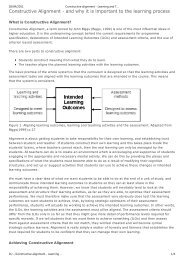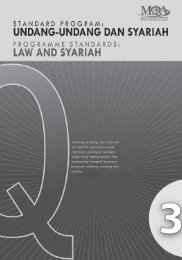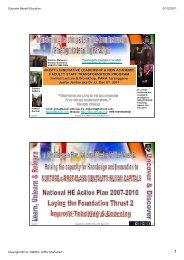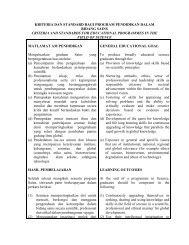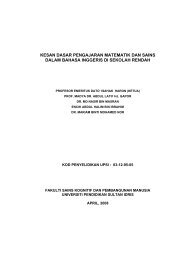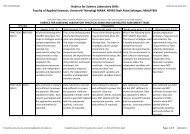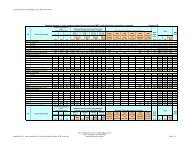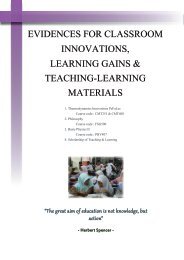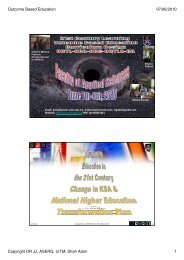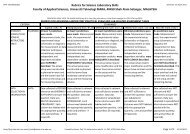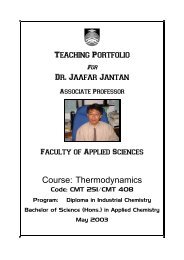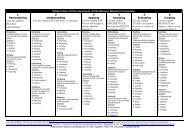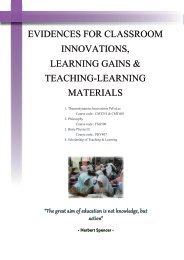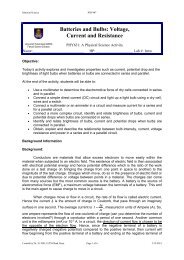UPSI talkpdf-color - DrJJ - UiTM
UPSI talkpdf-color - DrJJ - UiTM
UPSI talkpdf-color - DrJJ - UiTM
Create successful ePaper yourself
Turn your PDF publications into a flip-book with our unique Google optimized e-Paper software.
Outcome Based EducationMe with theDirector Generalof UNESCOSimposium Halatuju Pendidikan Fizik Di MalaysiaPersatuan Mahasiswa Sains <strong>UPSI</strong>, Tg Malim, PerakOct 3 rd , 2009Me with theHoward GardnerJaafar Jantan a.k.a. DR. JJ (Assoc. Prof., Dr.)Background picture: Aurora Borealis. What is Aurora? How does it happen?What are we seeing?email: jjnita@salam.uitm.edu.my, drjjlanita@hotmail.com; fsgobe@gmail.comWebsite: http://drjj.uitm.edu.my; http://www2.uitm.edu.my/drjj/Copyright <strong>DrJJ</strong>, ASERG, FSG <strong>UiTM</strong>, Oct 2009 1From the universe, nebulaes, stars, solar system,planets, our earth, magnetic field, charged particles,light years, acceleration, forces, nature, ionization,aurora, earthquake, tsunami, Ketsana, H1N1, to human& people interactions, humankind will never stopenduring and exploring in finding the truth…Copyright <strong>DrJJ</strong>, ASERG, FSG <strong>UiTM</strong>, Oct 2009 2Copyright DR JJ, ASERG, <strong>UiTM</strong>, ShahAlam 1
Outcome Based EducationMarc Tucker and Judy Codding urges adoption ofthinking curriculumthat provides a deep understanding of the subject andthe ability to apply that understanding to thecomplex, real-world problems that the student willface as an adultTucker, M.S. & Codding, J.B. (2002/1998).Copyright <strong>DrJJ</strong>, ASERG, FSG <strong>UiTM</strong>, Oct 2009 5Can explain: provide thorough, supported, and justifiable accountsof phenomena, facts, and data.Can interpret: tell meaningful stories; offer apt translations; providea revealing historical or personal dimension to ideas and events;make it personal or accessible through images, anecdotes,analogies, and models.Can apply: effectively use and adapt what we know in diversecontexts.Have perspectiveHave perspective: see and hear points of view through critical eyesand ears; see the big picture.Source: Grant Wiggins and Jay McTighe. Understanding by Design; Chap 4.Copyright <strong>DrJJ</strong>, ASERG, FSG <strong>UiTM</strong>, Oct 2009 6Copyright DR JJ, ASERG, <strong>UiTM</strong>, ShahAlam 3
Outcome Based EducationCan empathize: find value in what others might find odd, alien, orimplausible; perceive sensitively on the basis of prior directexperience.Have self-knowledgeknowledge: perceive the personal style, prejudices,projections, and habits of mind that both shape and impede our ownunderstanding; we are aware of what we do not understand and whyunderstanding is so hardGrant Wiggins and Jay McTighe. Understanding by Design; Chap 4.Copyright <strong>DrJJ</strong>, ASERG, FSG <strong>UiTM</strong>, Oct 2009 7CognitiveKnowing, the HeadThe KNOWLEDGEProducing Change:The 3 Domains of Educational GoalsPsychomotorDoing, The Hand, BodyThe SKILLSThe Hand3HAffectiveFeeling, The HeartThe CARECopyright <strong>DrJJ</strong>, ASERG, FSG <strong>UiTM</strong>, Oct 2009 8Copyright DR JJ, ASERG, <strong>UiTM</strong>, ShahAlam 4
Outcome Based EducationCopyright <strong>DrJJ</strong>, ASERG, FSG <strong>UiTM</strong>, Oct 2009 9“Teachers are powerful people and keepers of the future. Help your studentsdream big!” Leslie Owen Wilson“The only person who is educated is the one who has learned how to learn andchange.” Carl Rogers“The principle goal of education is to create menwho are capable of doing new things, not simplyof repeating what other generations have done --men who are creative, inventive and discoverers.“ Jean PiagetCopyright <strong>DrJJ</strong>, ASERG, FSG <strong>UiTM</strong>, Oct 2009 10Copyright DR JJ, ASERG, <strong>UiTM</strong>, ShahAlam 5
Outcome Based EducationMe with Edward De Bono‣ Born & Raised in the state of Hang Jebat…‣ Early education at St. David’s, Science Malacca & SDAR (Seremban)‣ B.Sc. Physics (1983); M.Sc. Condensed Matter (1985) - KSU‣ Teaching Certificate (1986) – MPTI‣ Served ITM – Jan 1987‣ PhD Physics Education (1991-1994)‣ Physics & Education expert• Practiced OBE & Active Learning especially since 1997.• Vice-Chair Asian Physics Education Network (ASPEN), UNESCO• Chair for ASPEN, Malaysia• Nominated for Innovative Teaching & Learning National & International• Member, Science Educ. Committee, Academy Science Malaysia since 2005.• Keynote, Plenary and Invited Speaker in Conferences Nationally &InternationallyCopyright <strong>DrJJ</strong>, ASERG, FSG <strong>UiTM</strong>, Oct 2009 13Learning OutcomesAt the end of this lecture, you will be able to:1. Provide 3 examples of a learning outcomes.2. Discuss MOHE’s “Human Capital With 1 st Class Mentality”.3. Summarize Spady’s OBE in less than 100 words.4. Elaborate and discuss your role as future physics teachers based onthe Core Competencies for Physics Teachers.Copyright <strong>DrJJ</strong>, ASERG, FSG <strong>UiTM</strong>, Oct 2009 14Copyright DR JJ, ASERG, <strong>UiTM</strong>, ShahAlam 7
Outcome Based Education1. Critical thinking and problem solving skills (P)-LO32. Communication skills (P)-LO43. Group working skills (A)-LO54. Ethics and professionalism (A)-LO65. Lifelong learning and information management (A)-LO76. Entrepreneurship skills (P)-LO87. Leadership skills (A)-LO9Copyright <strong>DrJJ</strong>, ASERG, FSG <strong>UiTM</strong>, Oct 2009 19Three to five years upon completing the program, graduateswill be educators who are ethical and competent in teachingand learning and who are multi skilled, includingentrepreneurship and are able to work in various sectorsSource: CRITERIA AND STANDARDS FOR PROGRAMMES IN THE FIELD OF EDUCATIONBAHAGIAN JAMINAN KUALITI, JABATAN PENDIDIKAN TINGGI, JANUARI 2003MQFCopyright <strong>DrJJ</strong>, ASERG, FSG <strong>UiTM</strong>, Oct 2009 20Copyright DR JJ, ASERG, <strong>UiTM</strong>, ShahAlam 10
Outcome Based EducationAt the end of a programme in education graduates will be able toapply their knowledge and skills to:1. Plan, execute, assess and manage teaching and learning.2. Facilitate the optimum development of a balanced individual.3. Safeguard the ethics and profession of teaching.4. Continuously upgrade and enhance themselves through life long learning.5. Enhance the quality of education through research.6. Assume leadership in striving for a virtuous and knowledgeable society.MQFCopyright <strong>DrJJ</strong>, ASERG, FSG <strong>UiTM</strong>, Oct 2009 21Copyright <strong>DrJJ</strong>, ASERG, FSG <strong>UiTM</strong>, Oct 2009 22Copyright DR JJ, ASERG, <strong>UiTM</strong>, ShahAlam 11
Outcome Based Education‣The result or consequence of a performance (in terms of success andfailure).‣the way a thing turns out; a consequenceThe outcome of my discussion with PM Madya DrNurul is, an invited talk given by me today.Upon the completion of your study at <strong>UPSI</strong> you willbe able to apply your knowledge and skills to ……Upon completion of the symposium today, you will beable….Copyright <strong>DrJJ</strong>, ASERG, FSG <strong>UiTM</strong>, Oct 2009 23What is a Program/Course/Lesson Outcome??A statement of what students will be able to do when they havecompleted the program/course/lesson and it involves graduate'sskills and knowledge that arise from the educational activities ofthe program/course/lesson which lead to the achievement of theProgram ObjectivesAn outcome has three major components:‣A description of what the you will be able to do‣The conditions under which you will perform the task.‣The criteria for evaluating your performance.Copyright <strong>DrJJ</strong>, ASERG, FSG <strong>UiTM</strong>, Oct 2009 24Copyright DR JJ, ASERG, <strong>UiTM</strong>, ShahAlam 12
Outcome Based EducationAn outcome at the course levelconditionActionObservableMeasurableCriteriaAt the end of this talk,you will be able to writea 200-words summary about OBE and competencyCopyright <strong>DrJJ</strong>, ASERG, FSG <strong>UiTM</strong>, Oct 2009 25Copyright <strong>DrJJ</strong>, ASERG, FSG <strong>UiTM</strong>, Oct 2009 26Copyright DR JJ, ASERG, <strong>UiTM</strong>, ShahAlam 13
Outcome Based EducationIn Spady’s words: “Outcome-Based Education means clearlyfocusing and organizing everything in an educational systemaround what is essential for all students to be able to dosuccessfully at the end of their learning experiences.This means starting with a clear picture of what is important forstudents to be able to do, , then organizing the curriculum,instruction, and assessment to make sure this learning ultimatelyhappens”(Spady,, 1994:1)Source: Killen, Roy (2005). Programming and assessment for quality teaching andlearning. Chapter 2. Thomson Social Science PressCopyright <strong>DrJJ</strong>, ASERG, FSG <strong>UiTM</strong>, Oct 2009 27OBE is an approach to planning, delivering and evaluatinginstruction that requires administrators, teachers and studentsto focus their attention and efforts on the desired results ofeducation—results that are expressed in terms of individualstudent learningSource: Killen, Roy (2005). Programming and assessment for quality teaching andlearning. Chapter 2. Thomson Social Science PressCopyright <strong>DrJJ</strong>, ASERG, FSG <strong>UiTM</strong>, Oct 2009 28Copyright DR JJ, ASERG, <strong>UiTM</strong>, ShahAlam 14
Outcome Based EducationTraditional/Transitional OBE emphasises student mastery oftraditional subject-related academic outcomes (usually with a strongfocus on subject-specific specific content) and some cross-disciplineoutcomes (such as the ability to solve problems or to work co-operatively).Transformational OBE emphasises long-term, cross-curricularcurricularoutcomes that are related directly to students’ future life roles (suchas being a productive worker or a responsible citizen or a parent).Spady (1994)Source: Killen, Roy (2005). Programming and assessment for quality teaching andlearning. Chapter 2. Thomson Social Science PressCopyright <strong>DrJJ</strong>, ASERG, FSG <strong>UiTM</strong>, Oct 2009 29Spady• favours the transformational approach to OBE whereoutcomes are “high-quality, culminating demonstrations ofsignificant learning in context”• learning is not significant unless the outcomes reflect thecomplexities of real life and give prominence to the life-roles that learners will face after they have finished theirformal education.Source: Killen, Roy (2005). Programming and assessment for quality teaching andlearning. Chapter 2. Thomson Social Science PressCopyright <strong>DrJJ</strong>, ASERG, FSG <strong>UiTM</strong>, Oct 2009 30Copyright DR JJ, ASERG, <strong>UiTM</strong>, ShahAlam 15
Outcome Based EducationKey Competencies in Australia (Mayer, 1993)Education must be oriented to the future needs of students, and ofsociety in general(Northern Territory Board of Studies, 1998:2)“The learning outcomes comprise the knowledge, understanding,skills and attitudes that students should acquire to enable them toreach their full potential and lead successful and fulfilling lives asindividuals, as of the community and at work”Source: Killen, Roy (2005). Programming and assessment for quality teaching andlearning. Chapter 2. Thomson Social Science PressCopyright <strong>DrJJ</strong>, ASERG, FSG <strong>UiTM</strong>, Oct 2009 31Copyright <strong>DrJJ</strong>, ASERG, FSG <strong>UiTM</strong>, Oct 2009 32Copyright DR JJ, ASERG, <strong>UiTM</strong>, ShahAlam 16
Outcome Based Education‣Competenceis a cluster of related abilities, commitments,knowledge, and skills that enable a person (or an organization) toact effectively in a job or situation. It indicates sufficiency (state ofbeing 'good enough') of knowledge and skills.‣Competency(plural competencies) refers to a cluster of abilitiesrelating to excellence in a specific activity.Source: BusinessDictionary.com;http://www.businessdictionary.com/definition/competence.html‣The ability to do something well. Source: Cambridge Advanced Learner's Dictionary‣The quality of being adequately or well qualified physically andintellectually. Source: The Sage DictionaryCopyright <strong>DrJJ</strong>, ASERG, FSG <strong>UiTM</strong>, Oct 2009 33JudgeworkplaceCompetencyAssess the specified outcomes(Explicit, observableworkplace performances)Knowledge (cognition)Skills & Abilities (Psychomotor)Caring (Affective)Specify theoutcomes inall 3 domainof learningrelevant toworkplaceSource:Competency-BasedEducation– Neithera Panacea nor aPariah ProfessorJohn A. BowdenDirector,EducationalProgrammeImprovementGroup RoyalMelbourne Instituteof Technology,AustraliaCopyright <strong>DrJJ</strong>, ASERG, FSG <strong>UiTM</strong>, Oct 2009 34Copyright DR JJ, ASERG, <strong>UiTM</strong>, ShahAlam 17
Outcome Based EducationCore Competencies of Physics Teachers2. Instructional Methodology1. Skills of Teaching: Physics teachers know the equipment,materials, and preparation required in the laboratory.‣ Physics teachers, incorporate instructional materials, create acommunity of diverse student learners who can constructmeaning from science and possess a disposition for furtherinquiry and learning2. Curriculum – Physics teachers know the earth science curriculum‣ The physics teacher develops and applies a coherent, focusedphysics curriculum that is consistent with state and nationalstandards for physics education and appropriate foraddressing the need, abilities, and interests of students..Copyright <strong>DrJJ</strong>, ASERG, FSG <strong>UiTM</strong>, Oct 2009 37Core Competencies of Physics Teachers2. Instructional Methodology3. Social Context – Physics teachers know the relation betweenscience and the community and know the human and institutionalresources in the community.1. Physics teachers can relate science to the community and usehuman and institutional resources in the community to advancethe education of their students in physics4. Assessment - The physics teacher knows a variety ofcontemporary assessment strategies to evaluate the intellectual,social, and personal development of the learner in all aspects ofphysics. Assessment refers to knowing the measurement andevaluation of student learning in a variety of dimensions includingstate assessmentsCopyright <strong>DrJJ</strong>, ASERG, FSG <strong>UiTM</strong>, Oct 2009 38Copyright DR JJ, ASERG, <strong>UiTM</strong>, ShahAlam 19
Outcome Based EducationCore Competencies of Physics Teachers2. Instructional Methodology4. Assessment‣ The physics teacher uses a variety of contemporary assessmentstrategies to evaluate the intellectual, social, and personaldevelopment of the learner in all aspects of science5. Environment for Learning – Physics teachers know safe and supportivelearning environments reflecting high expectations for the success of allstudents Physics teachers design and manage the instructional environment.Copyright <strong>DrJJ</strong>, ASERG, FSG <strong>UiTM</strong>, Oct 2009 39Core Competencies of Physics Teachers3. Professional Practice:1. Physics teachers have a knowledge base that prepares them forprofessional practice. It refers to:‣ Knowledge of science and educational professionalorganizations.‣ Knowledge of standards of ethical behavior consistent with thebest interests of students and the community2. Physics teachers participate in the professional community,improving practice through their personal actions, education, anddevelopment.Copyright <strong>DrJJ</strong>, ASERG, FSG <strong>UiTM</strong>, Oct 2009 40Copyright DR JJ, ASERG, <strong>UiTM</strong>, ShahAlam 20
Outcome Based Education1.0 Core Competency-CONTENTCONTENTThe physics teacher has a deep understanding of the following bigideas of physics:1. Application of mathematical concepts and skills to the analysis ofphysical systems2. Mechanics3. Electricity & Magnetism4. Waves & Optics5. Fluid Statics and Dynamics6. Particle nature of matter and its supporting evidence7. Conservation Laws8. Heat and Temperature9. Ideal Gas Law10. ThermodynamicsCopyright <strong>DrJJ</strong>, ASERG, FSG <strong>UiTM</strong>, Oct 2009 411.0 Core Competency-CONTENTCONTENTThe physics teacher has a basic understanding of:1. Technological applications of electricity and electronics2. Atomic Structure and Spectroscopy3. Nuclear physics, radioactivity, fission and fusion4. Fundamental particles, fundamental forces5. Wave/particle duality6. Heisenberg’s Uncertainty Principle and Bohr’s CorrespondencePrinciple7. Frames of reference and Galilean relativity8. Special relativistic kinematics9. Interrelationship of matter and energy10. Applications of physics concepts and principles to contexts in biology,chemistry, and earth and space scienceCopyright <strong>DrJJ</strong>, ASERG, FSG <strong>UiTM</strong>, Oct 2009 42Copyright DR JJ, ASERG, <strong>UiTM</strong>, ShahAlam 21
Outcome Based Education1.0 Core Competency-CONTENTCONTENTThe Physics teacher is able to determine students’ ideas on:1. Motion2. Nature of forces3. Forces and Motion4. Energy5. Light6. Heat and Temperature7. Electric Circuits8. Basic electricity and magnetismFamiliar with and have utilized inventories such as FCI, MBT, FCME ,CSEM,ECCE, BEMA., WCI, HTCECopyright <strong>DrJJ</strong>, ASERG, FSG <strong>UiTM</strong>, Oct 2009 431.0 Core Competency-CONTENTCONTENTInquiry – The physics teacher is able to1. Operationalize definitions of physical quantities2. Generate and evaluate questions that can be answered throughscientific investigations.3. Plan and conduct systematic and complex scientific investigations.4. Synthesize a revised scientific explanation using evidence, data, andinferential logic.5. Analyze how physical, conceptual, and mathematical models representand are used to investigate objects, events, systems, and processes.6. Report and evaluate complex scientific investigations and explanationsof objects, events, systems, and processes.7. Analyze why curiosity, honesty, cooperation, openness, and skepticismare important to scientific explanations and investigations.Copyright <strong>DrJJ</strong>, ASERG, FSG <strong>UiTM</strong>, Oct 2009 44Copyright DR JJ, ASERG, <strong>UiTM</strong>, ShahAlam 22
Outcome Based Education1.0 Core Competency-CONTENTCONTENTInquiry – The physics teacher is able to8. Analyze scientific theories for logic, consistency, historical and currentevidence, limitations, and capacity to be investigated and modified.9. Evaluate inconsistent or unexpected results from scientificinvestigations using scientific explanations.10. Analyze scientific investigations for validity of method and reliability ofresults.11. Discuss how scientific knowledge evolves.Copyright <strong>DrJJ</strong>, ASERG, FSG <strong>UiTM</strong>, Oct 2009 451.0 Core Competency-CONTENTCONTENT1.1 Application of mathematical concepts and skills to the analysis ofphysical systems including:i. Interpretation of graphs which are: Linear, Quadratic, Exponential &Trigonometricii.Algebra which includes Proportional reasoning, Interpretation ofmultivariable equations & Manipulation of multivariable equationsiii. Vectors • addition and subtraction • multiplication by a scalar • dotproduct and cross product • vector componentsiv. Matrix addition and multiplicationv. Concepts of calculus relevant to physics including Limits, Derivativesand integrals of functions, Slope of and area under graph followed byLine, surface, and volume integrals of vector and scalar fields.Copyright <strong>DrJJ</strong>, ASERG, FSG <strong>UiTM</strong>, Oct 2009 46Copyright DR JJ, ASERG, <strong>UiTM</strong>, ShahAlam 23
Outcome Based EducationCopyright <strong>DrJJ</strong>, ASERG, FSG <strong>UiTM</strong>, Oct 2009 47MQF – Bachelors degree (Hons.)MQFCopyright <strong>DrJJ</strong>, ASERG, FSG <strong>UiTM</strong>, Oct 2009 48Copyright DR JJ, ASERG, <strong>UiTM</strong>, ShahAlam 24
Outcome Based EducationMQF Framework for Degree level-OutcomesKnowledge & Comprehension• systematic and coherent body of complex knowledge, some of it at theboundaries of an academic discipline• major studies in which significant literature is available. Course content istaken to a significant depth and progressively developed to a high levelwhich provides a basis for postgraduate study and professional careers.Intellectual Skills• analytical techniques and problem solving skills that can be applied in manytypes of employment, including in a professionalMQFCopyright <strong>DrJJ</strong>, ASERG, FSG <strong>UiTM</strong>, Oct 2009 49MQF Framework for Degree level-OutcomesPsychomotor Skills• Practical/technical skills relevant to the disciplineGeneric Skills• communicate effectively.• interpersonal and team skills appropriate for employment• prepared to undertake research, comprehend and evaluate newinformation and concepts from a range of sources, weigh evidence,arguments and assumptions, to reach sound judgments,• have developed a foundation for self-directed and life long learning• exercise of substantial personal responsibility and decision-making incomplex and unpredictable circumstances.• Observation of professional ethicsMQFCopyright <strong>DrJJ</strong>, ASERG, FSG <strong>UiTM</strong>, Oct 2009 50Copyright DR JJ, ASERG, <strong>UiTM</strong>, ShahAlam 25
Outcome Based EducationCOURSE: PHY407Course Outcomes: Upon completion of this course, students will be able to:1. State, write and explain the concepts, laws and theories in electrostatics,electricity, magnetism, introductory atomic physics and modern physics.(LO1 (C1))2. Verbally, visually (pictures & graphs) and algebraically relate anddiscuss the concepts, laws and theories in electrostatics, electricity,magnetism, introductory atomic physics and modern physics. (C-Comprehension) (LO1- C2)3. Verify, assess & employ the concepts, laws and theories inelectrostatics, electricity, magnetism, light, introductory atomic physicsand modern physics to solve qualitative & quantitative problems visually,algebraically and occasionally, numerically. (C-Application) (LO1)Copyright <strong>DrJJ</strong>, ASERG, FSG <strong>UiTM</strong>, Oct 2009 51COURSE: PHY407Course Outcomes: cont…4. Analyze, summarize and discuss solution to real world problemsassociated with electrostatics, electricity, magnetism, introductory atomicphysics and modern physics. (for 3 rd year course only) (LO1 ( C4))5. Observe, formulate, plan, conduct, and report scientific investigations inareas of electrostatics and electricity. (LO2 (P4))6. Verbally justify and convince peers and the facilitator, their rationale forthe choice of methods, their ability to use and manipulate equipments, theneed to transform raw scores into tabular and graphical forms and theirability to explain and interpret results of their investigation in areas ofelectrostatics and electricity. (LO3(CTPS), LO4(CS))7. Collaborate, motivate and truthful with team members and withfacilitators in both the labs and in the classroom. (LO5 (TS), LO6 (EM))Copyright <strong>DrJJ</strong>, ASERG, FSG <strong>UiTM</strong>, Oct 2009 52Copyright DR JJ, ASERG, <strong>UiTM</strong>, ShahAlam 26
Outcome Based EducationAt the end of this activity students will be able to:1. Draw the electric force exerted by one point charge ontoanother and describe the motion of charges in thepresence of other point charges.2. Describe the cause of motion between point charges.3. Describe and produce a model of the force in terms of thestrength and direction that are acting on and by a pointcharge and on and by many point charges.Copyright <strong>DrJJ</strong>, ASERG, FSG <strong>UiTM</strong>, Oct 2009 53At the end of this activity students will be able to:4. Describe and draw the electric field patterns created bypoint charges surrounding a point charge.5. Describe and draw the electric field patterns surroundingtwo like point charges and two unlike point charges.6. Measure the strength of an electric field produced by apoint charge at various localities and produce amathematical model of the strength.Copyright <strong>DrJJ</strong>, ASERG, FSG <strong>UiTM</strong>, Oct 2009 54Copyright DR JJ, ASERG, <strong>UiTM</strong>, ShahAlam 27
Outcome Based EducationAt the end of this activity students will be able to:Draw the electric force exerted by one point chargeonto another and describe the motion of charges inthe presence of other point charges.Copyright <strong>DrJJ</strong>, ASERG, FSG <strong>UiTM</strong>, June 2009 55At the end of this activity students will be able to:Describe and draw the electric field patternscreated by point charges surrounding a pointcharge.Copyright <strong>DrJJ</strong>, ASERG, FSG <strong>UiTM</strong>, June 2009 56Copyright DR JJ, ASERG, <strong>UiTM</strong>, ShahAlam 28
Outcome Based EducationUsing the the Electric Field Hockey PHET simulation and choose the hockey putt bethe negatively charged particle feeling the force, move a negative charge near it to“see” the force exerted on the putt. Then draw the force diagram based on yourobservation. Using a ruler, measure the length of each force line. Now compare theforce diagram for each of the electrons to your predicted diagram. How different arethey? Explain the similarity and differences you observed in terms of the direction andlength of the force line.4312LABCopyright <strong>DrJJ</strong>, ASERG, FSG <strong>UiTM</strong>, June 2009 57Copyright <strong>DrJJ</strong>, ASERG, FSG <strong>UiTM</strong>, June 2009 58Copyright DR JJ, ASERG, <strong>UiTM</strong>, ShahAlam 29
Outcome Based EducationCopyright <strong>DrJJ</strong>, ASERG, FSG <strong>UiTM</strong>, June 2009 59Copyright <strong>DrJJ</strong>, ASERG, FSG <strong>UiTM</strong>, June 2009 60Copyright DR JJ, ASERG, <strong>UiTM</strong>, ShahAlam 30
Outcome Based EducationReflection“The goal of intellectual education is not how to repeat orretain ready-made truths… . It is in learning to masterthe truth by oneself at the risk of losing a lot of time andgoing thru all the roundabout ways that are inherent inreal activity.” (Jean Piaget, Swiss cognitive psychologist, 1896-1980)“The The great aim of education is not knowledge, but action”.Herbert SpencerCopyright <strong>DrJJ</strong>, ASERG, FSG <strong>UiTM</strong>, June 2009 61“Education, Education, we see, is not merely gaining knowledge or skills helpful towardproductive work, though certainly that is a part of it. Rather it is a replenishmentand an expansion of the natural thirst of the mind and soul. Learning is a gradualprocess of growth, each step building upon the other. It is a process whereby thelearner organizes and integrates not only facts but attitudes and d values. The Lordhas told us that we must open our minds and our hearts to learn. There is a Chineseproverb: Wisdom is as the moon rises, perceptible not in progress s but in result. As ourknowledge is converted to wisdom, the door to opportunity is unlockedocked”. . Barbara W.Winder“The The one real goal of education is to leave a personasking questions”. . Max BeerbohmCopyright <strong>DrJJ</strong>, ASERG, FSG <strong>UiTM</strong>, April 200862Copyright DR JJ, ASERG, <strong>UiTM</strong>, ShahAlam 31
Outcome Based EducationCMAP-SCMAP-S-QCMAP-EDUCMAP-EDU-QCMAP-ACMAP-A-QCMAP-MCopyright <strong>DrJJ</strong>, ASERG, FSG <strong>UiTM</strong>, April 200863OBE is a method of curriculum design and teaching thatfocuses on what students can actually do after they aretaught. OBE addresses the key questions as:‣Why do you want them to learn it? – Vision, Mission, PEOs, , POs‣What do you want the students to learn? – course structure, syllabus‣How can you best help students learn it? – Learning Activities‣How will you know what they have learnt? - AssessmentCopyright <strong>DrJJ</strong>, ASERG, FSG <strong>UiTM</strong>, April 200864Copyright DR JJ, ASERG, <strong>UiTM</strong>, ShahAlam 32
Outcome Based EducationTowers (1996) listed four points to the OBE system that arenecessary to make it work:a) What the student is to learn must be clearly identified.b) The student’s progress is based on demonstrated achievement.c) Multiple instructional and assessment strategies need to beavailable to meet the needs of each student.d) Adequate time and assistance need to be provided so thateach student can reach the maximum potential.Copyright <strong>DrJJ</strong>, ASERG, FSG <strong>UiTM</strong>, April 2008651. Clarity of focus about outcomes‣Always have the significant, culminating exit outcomes as thefocus.‣Let the students know what they are aiming for.2. Designing backwards‣Design curriculum backward by using the major outcomes asthe focus and linking all planning, teaching and assessmentdecisions directly to these outcomesCopyright <strong>DrJJ</strong>, ASERG, FSG <strong>UiTM</strong>, April 200866Copyright DR JJ, ASERG, <strong>UiTM</strong>, ShahAlam 33
Outcome Based Education3. Consistent, high expectations of success‣Set the expectation that OBE is for ALL learners.‣Expect students to succeed by providing them encouragement toengage deeply with the issues they are learning and to achieve thehigh challenging standard set (Spady, 1994b).4. Expanded opportunity‣Develop curriculum to give scope to every learner to learn inhis/her own pace.‣Cater for individual needs and differences, for example,expansion of available time and resources so that all studentssucceed in reaching the exit outcomes.Copyright <strong>DrJJ</strong>, ASERG, FSG <strong>UiTM</strong>, April 200867TEACHING IS• An art of delivering info & processing of shared info• A process of transferring knowledge from teacher to students• Conveying knowledge in systematic way• Process of educating (an individual) another personn motivate to learn• Delivery of knowledge• "teaching is undertaking certain ethical tasks oractivities the intention of which is to inducelearning"Copyright <strong>DrJJ</strong>, ASERG, FSG <strong>UiTM</strong>, April 200868Copyright DR JJ, ASERG, <strong>UiTM</strong>, ShahAlam 34
Outcome Based EducationTEACHER IS• Mirror showing self n path of choices• Person or equipment that conduct the teaching. Person or equipmenthaving knowledge• Person who is knowledgeable, good listener and a motivator to ensureknowledge is fully received by students n to develop positive attitudesto students• Mentor, educator, expert, actor, performer, role-model,friends, evaluator• Tool that delivers knowledge thru effective communicationCopyright <strong>DrJJ</strong>, ASERG, FSG <strong>UiTM</strong>, April 200869•Linguistic intelligence•Logical-mathematical intelligence•Musical intelligence•Bodily-kinesthetic intelligence•Spatial intelligence•Interpersonal intelligence•Intrapersonal intelligence•Naturalists•….. Existential…..“... the theory validates educators' everyday experience: studentsthink and learn in many different ways.Copyright <strong>DrJJ</strong>, ASERG, FSG <strong>UiTM</strong>, April 200870Copyright DR JJ, ASERG, <strong>UiTM</strong>, ShahAlam 35
Outcome Based EducationSkills:AnalyseLinesLanguageListLogicNumbersWordsCoding Devices:COLORSHAPEMAPSIMAGINATIONDAYDREAMRYTHMCopyright <strong>DrJJ</strong>, ASERG, FSG <strong>UiTM</strong>, April 200871Copyright <strong>DrJJ</strong>, ASERG, FSG <strong>UiTM</strong>, April 200872Copyright DR JJ, ASERG, <strong>UiTM</strong>, ShahAlam 36
Outcome Based EducationKeyMemorySystems &How theyInteractBufferingRAMStorage MediaCopyright <strong>DrJJ</strong>, ASERG, FSG <strong>UiTM</strong>, April 200873KeyMemorySystems &How theyInteractShort term or Working Memory1-30 secs DurationLimited to 7+2 independent chunksLong Term MemoryMinutes to Lifetime RecallRote & Meaningful Learning ContinuumACTIVITY: READ & REMEMBER THE NUMBER21066119571963Copyright <strong>DrJJ</strong>, ASERG, FSG <strong>UiTM</strong>, April 200874Copyright DR JJ, ASERG, <strong>UiTM</strong>, ShahAlam 37
Outcome Based EducationInstrument: CSEM – Q7CRI=2,3Bef:61%, Aft:37%Bef:9%, Aft:10%Bef:15%, Aft:23%Bef:9%, Aft:13%Bef:6%, Aft:17%Copyright <strong>DrJJ</strong>, ASERG, FSG <strong>UiTM</strong>, April 200875Instrument: CSEM – Q8(a) 9%, After:7%(b) 18%, After:17%(c) 21%, After:17%CRI=1,3(d) 41%, After:37%(e) 12%, After:23%Copyright <strong>DrJJ</strong>, ASERG, FSG <strong>UiTM</strong>, April 200876Copyright DR JJ, ASERG, <strong>UiTM</strong>, ShahAlam 38



